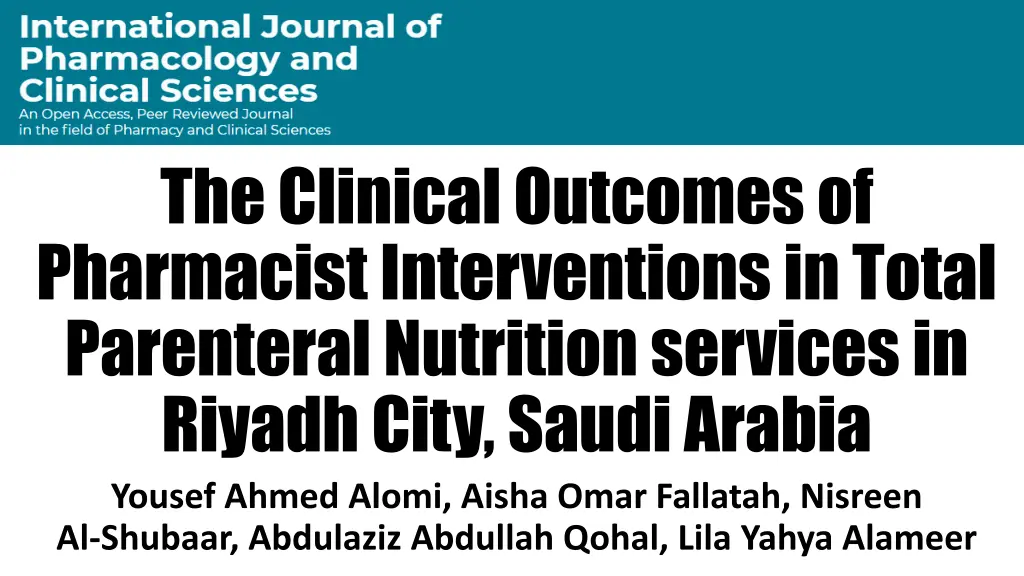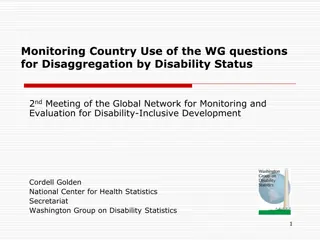
Clinical Outcomes of Pharmacist Interventions in Total Parenteral Nutrition Services
Explore the impact of pharmacist interventions in Total Parenteral Nutrition (TPN) services in Riyadh, Saudi Arabia. The study reveals significant improvements in patient outcomes, highlighting the crucial role of pharmacists in TPN therapy.
Download Presentation

Please find below an Image/Link to download the presentation.
The content on the website is provided AS IS for your information and personal use only. It may not be sold, licensed, or shared on other websites without obtaining consent from the author. If you encounter any issues during the download, it is possible that the publisher has removed the file from their server.
You are allowed to download the files provided on this website for personal or commercial use, subject to the condition that they are used lawfully. All files are the property of their respective owners.
The content on the website is provided AS IS for your information and personal use only. It may not be sold, licensed, or shared on other websites without obtaining consent from the author.
E N D
Presentation Transcript
The Clinical Outcomes of Pharmacist Interventions in Total Parenteral Nutrition services in Riyadh City, Saudi Arabia Yousef Ahmed Alomi, Aisha Omar Fallatah, Nisreen Al-Shubaar, Abdulaziz Abdullah Qohal, Lila Yahya Alameer
ABSTRACT ABSTRACT: : Objectives Objectives: : Total parenteral nutrition (TPN) is the perilous component of nutritional care for neonatal, pediatric and adult patients. TPN is designated for someone who cannot or should not consume nutrients through their regular oral pathway. In this study, we explored the clinical outcomes of pharmacist intervention in Parenteral Nutrition at the public hospital in Riyadh city, Saudi Arabia. Methods Methods: : In prospective cohort studies, we simulated the data of 12 months of 2015 related to TPN services for neonatal, pediatric and adult patients. Most of the TPN units at hospitals works eight hours per day and seven days per a week. The hospital in Riyadh, Saudi Arabia has 300 beds. The pharmacist intervention consisted of an International Study Model, measure level of activity, rational of clinical intervention, recommendation, and patient with outcome impact. The data were analyzed through Survey Monkey system.
ABSTRACT: ABSTRACT: Results Results: : The total number of pharmacist interventions were 402 of recognized TPN- related problems. The total number of TPN orders was 394 prescribed to 82 patients. The majority of patients were neonates 303 (75.56%) followed by Pediatrics 97 (24.19%). The highest number of critical care interventions were found to be potentially serious 108 (28.8%) and potentially significant 174 (46.4%). The documented rationale of clinical intervention activities was inappropriate dose 93 (24.8%) drug therapy omission 50 (13.3%) and inappropriate route of administration 41 (10.9%). Most of the patient outcomes were laboratory value improved 170 (45.33%) and patient condition improved 137 (36.53%). Conclusion Conclusion: : TPN clinical pharmacist had an essential vital role of preventing a TPN-related problem, improve patient outcome, and avoid the unnecessary supplementary cost. Increasing TPN clinical pharmacist assigned for all TPN services at all health care system in Saudi Arabia.
CONCLUSION: CONCLUSION: Pharmacists have been energetically contributing in providing PN-related services to patients in different countries. TPN clinical pharmacist had an essential vital role of preventing a TPN- related problem, improve patient outcome, and avoid the unnecessary supplementary cost. Increasing TPN clinical pharmacist assigned for all TPN services at all health care system in Saudi Arabia. The empowerment of pharmacists to accept a stronger leadership role in this measurement of pharmacy practice will improve the quality of care provided to patients getting PN therapy and improve PN services.







